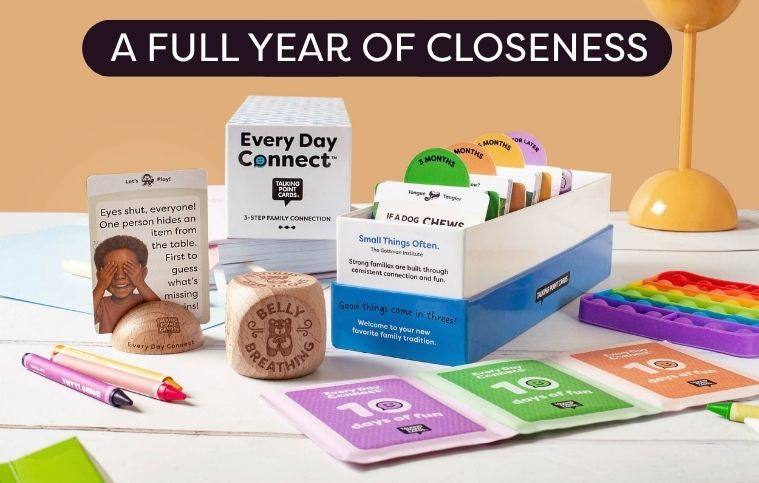SHOP
About
Why Faith Conversations Feel So Daunting
The 5 Ways
Making It Real In Your World
Your Next Step
Shop
You know that moment when you want to share something meaningful about your faith, but the words get stuck somewhere between your heart and your mouth? Yeah. Same.
We've all been there – sitting across from a friend at coffee, watching our kids play, or even lying in bed next to our spouse, feeling this gentle nudge to go deeper. To talk about the stuff that actually matters. But then that familiar anxiety creeps in.
What if they think I'm being preachy? What if it gets weird? What if I say the wrong thing?
Here's the thing I've learned after years of fumbling through these conversations (and trust me, there's been some spectacular fumbling): meaningful faith conversations don't have to feel like you're delivering a sermon or conducting an intervention.
They can be as natural as breathing – if you know how to create the right space for them.
Why Faith Conversations Feel So Daunting
Let's be honest for a second. Moving our existing interactions with friends and neighbours onto a conversation that is eternally significant feels difficult. There's something about bringing up faith that feels... loaded. Heavy. Like we're shifting from casual Friday to Sunday service in the span of a sentence.
But here's what might surprise you: according to a recent survey, 33% of non-Christians are open to talking more about faith. That's 1 in 3 of our friends, waiting for and wanting us to initiate a spiritual conversation.
So if people are actually open to these conversations, why do they still feel so hard?
Because most of us are approaching them all wrong.
We think we need to have all the answers, deliver perfect theology, or somehow convince someone in a single conversation. But real faith sharing? It's more like planting seeds than conducting a harvest. And the best gardens grow when you create the right conditions – not when you force things to bloom.
1. Start With Your Story, Not Scripture
I used to think sharing faith meant having the right Bible verses ready, the perfect theological argument, or at least a really compelling case for Christianity.
Turns out, the most powerful thing you can share is often the messiest: your own story.
Your story is the one thing no one can argue with or dismiss. It's not theology – it's reality.
It's your reality.
Maybe it's how prayer carried you through a difficult season. Maybe it's the peace you found when you finally stopped trying to control everything. Maybe it's as simple as noticing how different you feel on Sunday mornings now.
The beauty of starting with your story is that it doesn't feel like evangelism – it feels like friendship. Because that's exactly what it is.
Try something like: "I've been thinking lately about how much my faith has helped me with..." or "You know what's been interesting? Ever since I started praying about this situation..."
Notice how that feels different than "Have you ever considered that you might need Jesus in your life?"
Your story creates a bridge instead of a barrier.
2. Ask Questions That Matter (And Actually Listen)
Most of us have been trained to think that sharing faith means talking more, not listening more. But some of the most meaningful conversations I've had started with a simple question – and then shutting up long enough to hear the answer.
Questions like:
-
"What's been giving you hope lately?"
-
"Do you ever think about bigger purpose stuff?"
-
"What helps you when things get really hard?"
These aren't "gotcha" questions designed to trap someone into a testimony. They're genuine curiosity about what makes someone tick, what they lean on, what matters to them.
And here's where it gets beautiful: when you ask questions like this and really listen, people often open doors you never expected. They'll mention feeling lost, or grateful, or searching for something more. They'll share their own moments of wonder or doubt or hope.
Those are your invitations.
When someone says "I just wish I knew what the point of all this is," that's not your cue to launch into a presentation about God's plan. That's your cue to say, "I've felt that way too. Want to know what's helped me with that feeling?"
3. Create Natural Conversation Spaces
Meaningful conversations rarely happen when we force them. They happen when we create space for them to unfold naturally.
This is where most of us get it wrong. We wait for the perfect moment, the right crisis, or some divine intervention to create the opportunity. But what if we could be more intentional about creating these spaces?
Think about it: when do your best conversations usually happen? In the car on long drives? Late at night when the kids are finally asleep? While you're doing dishes together?
Start paying attention to those moments and lean into them. Instead of filling comfortable silence with small talk, try asking one deeper question. Instead of keeping things light, venture into something real.
Some of my favorite faith conversations have happened while folding laundry with my sister, sitting on the porch after dinner, or during those few minutes before bedtime prayers with my kids.
The key is recognizing that these everyday moments are actually sacred opportunities – if we have eyes to see them.

Rated #1 Christian Product
Deepen faith, strengthen fellowship, and spark meaningful conversations in families, small groups, and beyond.

4. Use Tools That Take the Pressure Off
Here's something I wish someone had told me years ago: you don't have to be the conversation starter AND the conversation guide AND the theology expert all at the same time.
Sometimes the best thing you can do is let someone else – or something else – help carry the conversation.
This is where tools like Talking Point Cards Christian Edition come in handy. These aren't your typical icebreaker cards. They're carefully crafted questions and prompts by experienced ministry and communication professionals designed to start healthy and faith-filled discussions.
Picture this: instead of sitting around the dinner table wondering how to bring up deeper topics with your family, you pull out a card that asks something like "What's one prayer you've seen answered this year?" or "If you could ask God one question, what would it be?"
Suddenly, the pressure's off you to manufacture the moment or come up with the perfect question. The card does the heavy lifting, and you get to focus on listening and responding.
I've used these with my own family, and I'm always amazed at what comes out. Kids will share things they've never mentioned before. Spouses will open up about struggles or hopes they hadn't found words for.
With 200 ways to ignite edifying and faith-filled discussion, you've got options for different moods, different people, different seasons. Some cards are gentle conversation starters. Others dive deeper. Some are perfect for couples, others work better in groups.
The genius is that they create permission for everyone to go deeper without anyone feeling put on the spot or pressured to perform.
5. Embrace the Awkward (It's Actually a Good Sign)
This might be the most important thing I can tell you: awkward isn't the enemy of meaningful conversation. Awkward is often the doorway.
Think about it – when was the last time you had a conversation that changed something in you? Chances are, it felt a little uncomfortable at first. A little uncertain. Maybe even a little scary.
That's because we're leaving the safety of small talk and entering the territory where real things happen.
The problem is, most of us bail out the moment things feel awkward. We laugh it off, change the subject, or make a joke. But what if we stayed in that space for just a few seconds longer?
It may feel awkward at first, but as you practice, that question becomes a natural fit for you in conversation. The more you lean into these moments instead of away from them, the more natural they become.
Here's my challenge for you: the next time a conversation starts to veer toward something meaningful and you feel that familiar awkward tension, don't run. Take a breath. Ask one more question. Share one more honest thing about your own experience.
You might be surprised at what happens on the other side of that awkwardness.
Making It Real in Your World
The truth is, most of us already have all the opportunities we need for meaningful faith conversations. We don't need to knock on doors or become street evangelists or join a missions trip to another country.
We need to start seeing the sacred in the ordinary. The divine appointments that are already built into our days.
Your morning coffee with your neighbor. The car ride with your teenager. The text conversation with your struggling friend. The dinner table with your family.
These aren't just life maintenance activities – they're mission fields. Not in the aggressive, convert-everyone sense, but in the gentle, love-well sense.
Start small. Choose one relationship this week where you want to go a little deeper. Think about what questions you could ask, what stories you could share, what space you could create.
And remember – you don't have to have it all figured out to start these conversations. You just have to be willing to be real about your own journey, curious about theirs, and patient with the process.
Some of the most powerful faith conversations I've ever had started with "I don't know, but here's what I've been thinking about..." or "I'm still figuring this out, but..."
Perfect theology isn't the goal. Authentic connection is.
Your Next Step
If you're feeling that familiar stirring – that gentle nudge to go deeper in your conversations – don't ignore it. That's not anxiety; that's invitation.
Start with one person. One question. One honest moment.
And if you need a little help breaking the ice? Those conversation cards I mentioned aren't just another gadget. They're a bridge between where you are now and where you want to be relationally. A tool that takes the pressure off and puts the focus back where it belongs: on connection, understanding, and genuine love.
Because at the end of the day, that's what faith conversations are really about. Not winning arguments or checking boxes, but loving people well by inviting them into the most important conversations of their lives.
And you know what? You're already equipped for that. You always have been.
At Talking Point Cards, we believe that faith and fellowship grow deeper through open, honest conversations. Our carefully designed prompts help individuals, families, and groups explore life, purpose, and belief together - creating space for reflection, connection, and shared understanding. Because the most meaningful spiritual journeys are walked side by side, one conversation at a time.
Let's Stay Connected
Love what you’re reading? There’s more where that came from. Get fresh ideas, inspiring tips, and simple ways to spark deeper conversations - delivered straight to your inbox. Because the best connections start here. Just pop in your email below to join us.
We respect your privacy. We’ll never share or sell your information. By subscribing, you agree to receive emails from us. Unsubscribe anytime.












